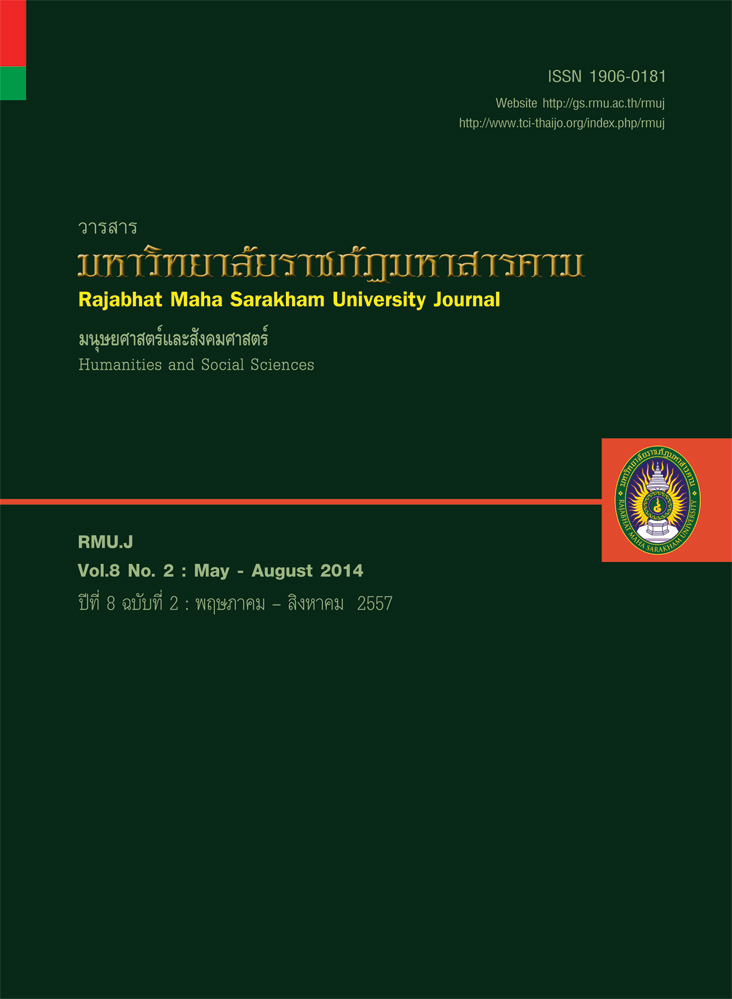การเปรียบเทียบผลการเรียนประเด็นปัญหาทางสังคมที่เกี่ยวข้องกับการใช้วิทยาศาสตร์ โดยใช้การ เรียนแบบผสมผสานตามวิธีการทางวิทยาศาสตร์กับการเรียนแบบปกติที่มีต่อความสามารถในการโต้ แย้งและการคิดเชิงเหตุผลของนักเรียนชั้นมัธยมศึกษาปีที่ 1 ที่มีแรงจูงใจใฝ่สัมฤทธิ์ต่า
Main Article Content
บทคัดย่อ
การวิจัยครั้งนี้มีวัตถุประสงค์เพื่อศึกษาและเปรียบเทียบผลการเรียนประเด็นปัญหาทางสังคมที่เกี่ยวข้องกับการใช้วิทยาศาสตร์
โดยใช้การเรียนแบบผสมผสานตามวิธีการทางวิทยาศาสตร์กับการเรียนปกติที่มีต่อความสามารถในการโต้แย้งและการคิดเชิงเหตุผล
ของนักเรียนระดับชั้นมัธยมศึกษาปีที่ 1 จำนวน 52 คน ที่มีแรงจูงใจใฝ่สัมฤทธิ์ต่างกัน ซึ่งได้มาโดยการสุ่มแบบกลุ่ม โดยกลุ่มทดลอง
เรียนแบบผสมผสานตามวิธีการทางวิทยาศาสตร์ และกลุ่มควบคุมเรียนแบบปกติ เครื่องมือที่ใช้ในการวิจัยประกอบด้วย 1) แผนการ
จัดการเรียนรู้ประเด็นปัญหาทางสังคมที่เกี่ยวข้องกับการใช้วิทยาศาสตร์ 3 ประเด็น คือ พืช GMO การโคลนนิ่ง และ การปลูกถ่าย
อวัยวะ สำหรับกลุ่มทดลองและกลุ่มควบคุม กลุ่มละ 3 แผน แผนละ 3 ชั่วโมง/สัปดาห์ 2) แบบทดสอบวัดการคิดเชิงเหตุผล จำนวน
30 ข้อ และ 3) แบบทดสอบวัดความสามารถในการโต้แย้ง จำนวน 4 ฉบับ ฉบับละ 4 ข้อ สถิติที่ใช้ในการทดสอบสมมติฐาน ได้แก่
Paired t-test และ F-test (Two - way MANCOVA) ผลการวิจัยพบว่า
นักเรียนโดยส่วนรวมและจำแนกตามแรงจูงใจใฝ่สัมฤทธิ์หลังเรียนประเด็นปัญหาทางสังคมที่เกี่ยวข้องกับการใช้วิทยาศาสตร์
โดยใช้การเรียนแบบผสมผสานตามวิธีการทางวิทยาศาสตร์และการเรียนแบบปกติมีการพัฒนาความสามารถในการโต้แย้งจากการสอบ
และการคิดเชิงเหตุผลเพิ่มขึ้นจากก่อนเรียน (p < .0001) นักเรียนที่มีแรงจูงใจใฝ่สัมฤทธิ์สูง มีเฉพาะความสามารถในการคิดเชิงเหตุผล
มากกว่านักเรียนที่มีแรงจูงใจใฝ่สัมฤทธิ์ตํ่า(p .012) ส่วนนักเรียนที่เรียนด้วยการเรียนแบบผสมผสานตามวิธีการทางวิทยาศาสตร์หลัง
เรียนประเด็นปัญหาทางสังคมที่เกี่ยวข้องกับการใช้วิทยาศาสตร์มีความสามารถในการโต้แย้งและการคิดเชิงเหตุผลมากกว่านักเรียนที่
เรียนด้วยการเรียนแบบปกติ(p .003) อย่างไรก็ตาม ไม่มีปฏิสัมพันธ์ระหว่างแรงจูงใจใฝ่สัมฤทธิ์กับรูปแบบการเรียนประเด็นปัญหา
ทางสังคมที่เกี่ยวข้องกับการใช้วิทยาศาสตร์ต่อความสามารถในการโต้แย้งและการคิดเชิงเหตุผลของนักเรียน
The objectives of this research were to study and compare the effects of learning socio-scientific issues
using the mixed methods based on the scientific method and the traditional learning method on argumentation
and logical thinking with different achievement motivation. The subjects used in the research were 52 grade 7th
students, selected through cluster random sampling technique. One of the two classes was selected to be the
experimental group and the other to be the control group. Each class initially consisted of 26 students. The
experimental group was taught by mixed methods based on the scientific method whilst the control group was
taught by traditional learning method. The instruments used in the research included: 1) 3 lesson plans related
to 3 socio-scientific issues: GMO plants, cloning, and organ transplantation for both of the experimental group
and control group. Each plan spent 3 hours per week, 2) a logical thinking test with 30 items, and 3) four
argumentation tests which were 4 items each. The hypotheses were tested using the Paired t-test and F-test
(Two-way MANCOVA).
The research findings revealed that the students classified by the high achievement motive students and
the low achievement motive students showed the significantly greater improvement of students’ argumentation
and logical thinking in overall (p<.0001). The high achievement motive students indicated more logical thinking
than the low achievement motive students ( p .012). In addition, the experimental group evidenced more
argumentation and logical thinking than the control group (p .003). However, there were no statistical interactions
between achievement motivation and learning methods on socio-scientific issues with the students’ ability in
argumentation and logical thinking.
Article Details
1. บทความที่ลงตีพิมพ์ทุกเรื่องได้รับการตรวจทางวิชาการโดยผู้ประเมินอิสระ ผู้ทรงคุณวุฒิ (Peer Review) สาขาที่เกี่ยวข้อง อย่างน้อย 3 ท่าน ในรูปแบบ Double blind review
2. ข้อคิดเห็นใด ๆ ของบทความที่ลงตีพิมพ์ในวารสารมหาวิทยาลัยราชภัฏมหาสารคาม นี้เป็นของผู้เขียน คณะผู้จัดทำวารสารไม่จำเป็นต้องเห็นด้วย
3. กองบรรณาธิการวารสารมหาวิทยาลัยราชภัฏมหาสารคาม ไม่สงวนสิทธิ์การคัดลอกแต่ให้อ้างอิงแสดงที่มา


